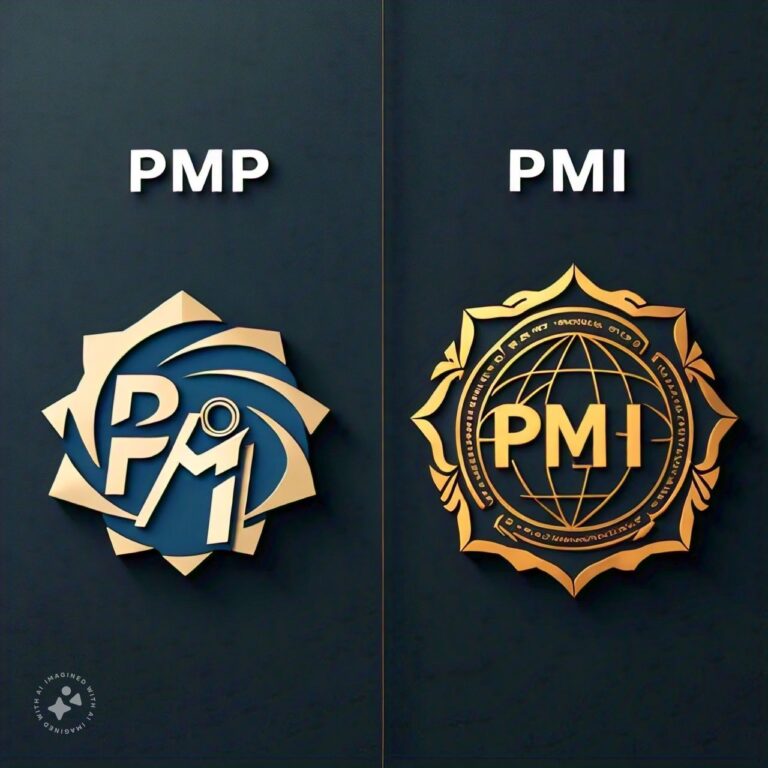
Differences Between PMP and PMI
In the world of project management, two commonly mentioned terms are PMP (Project Management Professional) and PMI (Project Management Institute). While these acronyms are often used together, they refer to different concepts that are integral to the field of project management. PMP is a certification, one of the most prestigious in the project management profession, while PMI is the organization that administers the PMP certification along with other project management credentials and standards. Understanding the difference between PMP and PMI is crucial for professionals aspiring to advance their careers in project management and for organizations looking to improve their project management practices.
PMP Overview
What is PMP?
PMP stands for Project Management Professional and is a globally recognized certification awarded by the Project Management Institute (PMI). The PMP certification is considered the gold standard for project managers and is highly sought after by professionals looking to demonstrate their expertise in project management. Earning a PMP certification indicates that a project manager has the skills and knowledge required to lead and manage projects successfully, from initiation to completion, using best practices defined by PMI.
Key Aspects of the PMP Certification
- Eligibility Requirements: To be eligible for the PMP certification, candidates must meet specific education and experience criteria. Typically, candidates need:
- A four-year degree (bachelor's degree or global equivalent) and at least three years of project management experience, with 4,500 hours leading and directing projects.
- OR a secondary degree (high school diploma, associate's degree, or global equivalent) and five years of project management experience, with 7,500 hours leading and directing projects.
- Additionally, all candidates must have 35 hours of project management education.
- Exam Content: The PMP exam consists of 180 questions that cover a broad range of topics related to project management. The exam focuses on three key domains:
- People: Leading and managing teams effectively.
- Process: Applying project management processes and methodologies to ensure successful project delivery.
- Business Environment: Understanding how projects align with business strategy and organizational goals.
- Exam Format: The PMP exam is a multiple-choice, multiple-response, matching, hotspot, and limited fill-in-the-blank questions test. It can be taken in person at a testing center or online.
- PMP Exam Prep: Preparing for the PMP exam typically involves studying the PMBOK (Project Management Body of Knowledge) Guide, which is the primary reference for the exam. Many candidates also take PMP preparation courses to help them grasp the wide range of topics covered in the exam.
- Validity and Renewal: The PMP certification is valid for three years. To maintain the certification, professionals must earn 60 Professional Development Units (PDUs) during the three-year period and report them to PMI to renew their certification.
Benefits of Earning a PMP Certification
- Career Advancement: PMP certification holders are often considered for senior project management roles and leadership positions. Many employers seek PMP-certified professionals due to their proven expertise and skills.
- Higher Salary: Studies show that PMP-certified professionals earn, on average, 20% more than their non-certified peers. This makes the PMP certification a valuable investment for career growth.
- Global Recognition: The PMP certification is recognized worldwide, making it valuable for professionals who want to work internationally or with global organizations.
- Improved Project Management Skills: Preparing for the PMP exam equips professionals with the latest project management methodologies, tools, and best practices, enhancing their ability to deliver successful projects.
- Network Opportunities: PMP-certified professionals gain access to PMI’s vast network of global professionals, offering opportunities for knowledge sharing, mentorship, and career development.
PMI Overview
What is PMI?
PMI stands for the Project Management Institute, a nonprofit professional organization that focuses on setting standards and offering certifications for project management. PMI was founded in 1969 and has since grown to become one of the largest and most influential organizations in the field of project management. PMI aims to promote project management best practices, offer certifications that validate project management expertise, and provide resources, research, and networking opportunities for project management professionals around the world.
Key Functions of PMI
- Certifications: PMI offers a wide range of certifications to suit various career stages and specializations in project management. These certifications include:
- PMP (Project Management Professional): The most well-known certification for experienced project managers.
- CAPM (Certified Associate in Project Management): Designed for entry-level project managers or those just starting their project management careers.
- PgMP (Program Management Professional): Focuses on managing multiple, related projects and ensuring alignment with organizational goals.
- PfMP (Portfolio Management Professional): Centers on managing a portfolio of projects to achieve business objectives.
- PMI-ACP (Agile Certified Practitioner): For project managers who specialize in Agile project management methodologies.
- PMI-RMP (Risk Management Professional): Focuses on project risk management.
- PMI-SP (Scheduling Professional): Concentrates on developing and maintaining project schedules.
- PMBOK Guide: PMI is responsible for publishing the Project Management Body of Knowledge (PMBOK) Guide, which serves as a foundational reference for project management professionals worldwide. The PMBOK Guide outlines standardized project management practices and processes, providing a framework for effective project management.
- Standards and Frameworks: PMI develops and maintains global standards and frameworks for project management. These standards are used by organizations to improve project performance and achieve strategic objectives.
- Research and Resources: PMI funds research in project management and produces a wide variety of resources, including white papers, case studies, reports, and webinars. These resources help professionals stay current with industry trends and best practices.
- Membership: PMI offers memberships that give professionals access to exclusive resources, events, and networking opportunities. PMI has more than 500,000 members in over 200 countries, making it a truly global organization.
- Chapters and Communities: PMI has local chapters and communities of practice that allow project management professionals to connect, share knowledge, and participate in events and workshops. These chapters are located worldwide and provide members with opportunities for professional development and networking.
- Events and Conferences: PMI hosts several events and conferences annually, including PMI Global Congress and regional events, where professionals gather to learn, network, and exchange ideas on the latest trends in project management.
Differences Between PMP and PMI
Although PMP and PMI are closely related, they serve distinct purposes in the field of project management:
- PMP (Project Management Professional):
- What it is: A professional certification awarded by PMI that validates an individual's expertise in project management.
- Purpose: The PMP certification demonstrates that a project manager has the experience, knowledge, and skills to lead projects effectively.
- Focus: PMP focuses on the individual’s ability to manage projects, lead teams, and use best practices in project management.
- PMI (Project Management Institute):
- What it is: A global nonprofit organization that sets the standards for project management and administers various project management certifications, including PMP.
- Purpose: PMI's role is to advance the project management profession by providing certifications, resources, and guidelines.
- Focus: PMI focuses on the development and promotion of project management as a discipline through certifications, research, and standards.
In summary:
- PMP is the certification that project managers earn to demonstrate their skills and qualifications.
- PMI is the organization that offers the PMP certification along with other project management credentials and resources.
Conclusion
In conclusion, while PMP and PMI are closely related, they serve distinct roles within the project management profession. PMP is a prestigious certification that validates an individual's project management skills and knowledge, while PMI is the global organization that administers this certification and promotes project management best practices through standards, research, and professional development opportunities. For project management professionals, earning the PMP certification through PMI is a valuable investment that can significantly advance their careers and improve their effectiveness in managing projects. Understanding the roles of both PMP and PMI will help individuals navigate their project management careers more effectively and contribute to the overall success of their organizations.
FAQs
Related Topics
- All
- Animals
- Diseases
- Health
- Money
- Politics
© 2024 OnYelp.com. All rights reserved. Terms and Conditions | Contact Us | About us





